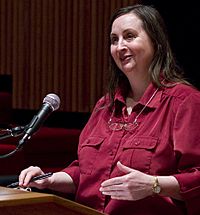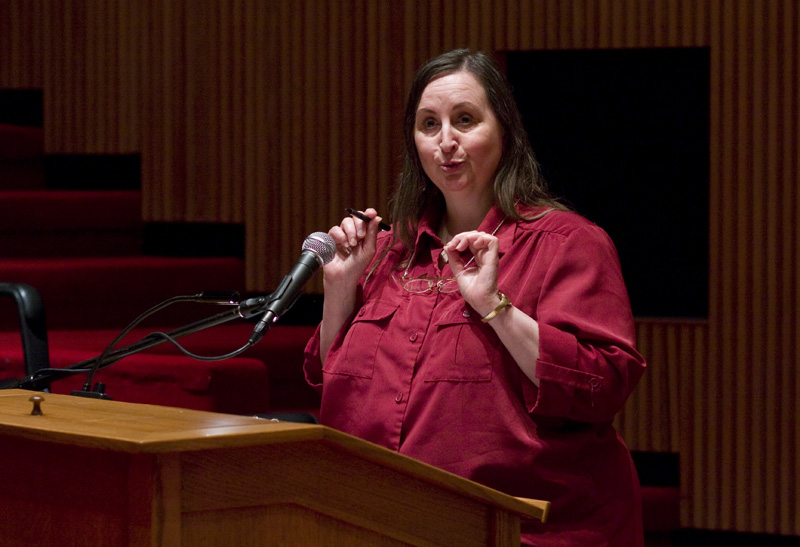Christine Korsgaard
Christine Marion Korsgaard ( born 1952 in Chicago) is an American philosopher who deals specifically with issues of ethics and has influential contributions to the interpretation of the philosophy of Immanuel Kant written.
Career
Korsgaard graduated to B. A. in 1974 at the University of Illinois. She then studied at Harvard until 1979, among others, John Rawls. In 1978, she worked at MIT from 1979 to 1980 and at Yale University as a lecturer. Your Ph.D. put it in 1981 at Harvard. After that teaching activities included at the University of California at Santa Barbara ( 1980-83 ), Berkeley (1989 ) and Los Angeles ( 1990) and in Chicago ( 1983-1991 ) on. In 1990 she was appointed professor. In 1991 she moved to Harvard. There she from 1995 until 2002, the Department of Philosophy and awarded the 1999 Arthur Kingsley Porter Professor Chair as of Philosophy.
Korsgard is a member of the American Philosophical Association, the North American Kant Society, the Hume Society and the American Society for Political and Legal Philosophy.
In 2004, Korsgaard received an honorary doctorate (LHD Doctor of Humane Letters; Latin: Litterarum humanarum doctor ) of the University of Illinois.
Teaching
Korsgaard is primarily concerned with moral philosophy and its history, practical reason (Kant), personal identity and the relationship between humans and animals.
She has previously written four books.
In "The Sources of Normativity " (1996), a preparation of their Tanner Lectures on Human Values 1992, she studied the history of ideas about the basis of the obligation in modern moral philosophy and takes a ajar to Kant constructivist position, after the normative truths are the result of deliberate human activity. Practical identity is a matter of interpretation, arising from the specific reasons and obligations. Normativity arises from the belief that a certain course of action is the most convincing solution to a problem. If you act different, you violates his conviction of what is right. Because of the reflexive structure of the human mind to form a self- concept that is responsible for recognizing reasons for action as binding. You develop substantive priorities and values on which it is based and that are relevant for that one considers an action to be correct and chooses consciously.
The second book "Creating the Kingdom of Ends" (1996 ) is a collection of thirteen essays on the ethics of Kant. Topics focus on the conditions of Deliberations and decision-making processes. The work is divided thematically into two parts: The first part of Korsgaard defends the Kantian ethics in terms of decision problems, and in the second part draws the author's other classic authors, such as Aristotle, Hume and Moore, zoom to its position on the edge discourse addition, hedge.
In "The Constitution of Agency" ( 2008) Korsgaard presents some essays on practical reason and moral psychology. Among other things it represents is the thesis that the principles of practical reason determine human action. By actions done in accordance with the categorical imperative, and in accordance with the principle of instrumental reason, the person is given the ability of self-control. According to Korsgaard is not egoism action-guiding, but the pursuit of the people for the good. She argues that between Aristotle's virtue ethics and Kantian ethics obligations insofar match, as both actions as determined by reason and understanding for both the moral good is the goal of the action. Both the Kantian maxims and the Aristotelian logos are expressions of reason.
Korsgaard distinguishes between plot and action. In contrast to the pure act ( " I lie " ) is a course of action ( " I lie to earn more money ") with a self-imposed purpose connected. The action is the bearer of moral value, while the action subject only to moral judgment. This Kant ( maxims ) and Aristotle differ (virtue ) of consequentialism is determinative for example utilitarianism.
Her latest work, " Self -Constitution: Agency, Identity, and Integrity " (2009 ) is an extension of her Locke Lectures of 2002 In this book, Korsgaard is concerned with the foundations of moral action.. For them, moral principles and principles of practical reason are generally determinative of the act and at the same time decisive for one's own identity. As a rational being, man is aware of the principles of his actions. Good for him is an act, if it causes the agent itself autonomously. The normative force of the principles of practical reason arises from the fact that the act of the will specifies that you also need the following principles. Man binds to principles like the categorical imperative or the recognition of the autonomy of the person.
Korsgaard defends her Constructivism in analogy with Wittgenstein's private language argument. Just as words get meaning only through communication with third parties so unfold reasons also its normative force only in public. Reasons that you accept to put an "I " forward. " My reasons are part of my practical identity; I construct my practical identity, so my existence pledge my reasons not preceded. [ ... ] This does not imply a third-person perspective, but rather the acceptance of a plural first-person perspective, [ ... ] In this plural first-person perspective, we are concerned with justification and not an explanation. "Declaration refers to property, to the being; Justification is about the obligation and shall be given to subjects.
Works (selection)
- The Sources of Normativity, Harvard University Press 1996, ISBN 978-0-521559607
- Creating the Kingdom of Ends, Cambridge University Press, ISBN 978-0-521499620
- The Constitution of Agency. Essays on Practical Reason and Moral Psychology, Oxford University Press 2008, ISBN 978-0-19-955274-0
- Self -Constitution: Agency, Identity, and Integrity, Oxford University Press 2009, ISBN 978-0-19-955280-1










